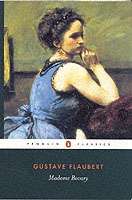Madame Bovary

Editorial Penguin UK
Fecha de edición enero 2003
Idioma inglés
Traducción de Wall, Geoffrey
Prologuista Roberts, Michele
EAN 9780140449129
384 páginas
Libro
encuadernado en tapa blanda
Resumen del libro
Oh, why, dear God, did I marry him?'
Emma Bovary is beautiful and bored, trapped in her marriage to a mediocre doctor and stifled by the banality of provincial life. An ardent devourer of sentimental novels, she longs for passion and seeks escape in fantasies of high romance, in voracious spending and, eventually, in adultery. But even her affairs bring her disappointment, and when real life continues to fail to live up to her romantic expectations the consequences are devastating. Flaubert's erotically charged and psychologically acute portrayal of Emma Bovary caused a moral outcry on its publication in 1857. It was deemed so lifelike that many women claimed they were the model for his heroine; but Flaubert insisted: Madame Bovary, c'est moi'.
This modern translation by Flaubert's biographer, Geoffrey Wall, retains all the delicacy and precision of the French original. The edition also contains a preface by the novelist Michèle Roberts.
Biografía del autor
Gustave Flaubert (1821-1880) no fue sólo un magistral adelantado de la modernidad, sino que fue también gran contador de historias, prodigioso captador de ambientes y extraordinario creador de caracteres. Además de "Madame Bovary", entre sus obras cabe destacar "La educación sentimental", "Salambó" y "Tres cuentos", obras todas ellas publicadas en Alianza Editorial.








